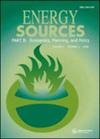A composite energy resilience performance indicator for Bangladesh
IF 2.2
4区 工程技术
Q3 ENERGY & FUELS
Energy Sources Part B-Economics Planning and Policy
Pub Date : 2022-12-01
DOI:10.1080/15567249.2022.2149901
引用次数: 1
Abstract
ABSTRACT A “Composite Energy Resilience Index (CERI)” was developed with 15 individual indicators. A two-round Delphi technique was used to interview stakeholders to extract key energy resilience issues of Bangladesh based on a conceptual framework from the literature review. A total of 15 indicators were selected from the findings of the Delphi technique and using these indicators, the energy resilience framework for the country was developed. Constructed CERI implies that energy resilience of Bangladesh is critically dependent on a set of affordability, sustainability, and availability issues as well as the qualitative aspects of the energy system management, such as institutional effectiveness, governance, and regulatory quality. It implies important policy implications in terms of developing holistic energy strategies for supporting the economic development aspiration of the country. The findings also suggest that the energy resilience performance under the planned scenario based on the long-term government plans and the business-as-usual scenario is likely to improve the resilience performance by 2030. However, the required improvement might be ambitious considering the low base level and the prevailing geopolitical situation. As such, a systematic approach to energy system resilience is warranted.孟加拉国的综合能源弹性性能指标
摘要建立了包含15个单项指标的“复合能量弹性指数”(CERI)。采用两轮德尔菲技术采访利益相关者,根据文献综述中的概念框架提取孟加拉国的关键能源弹性问题。从德尔菲技术的结果中共选择了15个指标,并使用这些指标,制定了该国的能源弹性框架。构建的CERI表明,孟加拉国的能源弹性严重依赖于一系列可负担性、可持续性和可用性问题,以及能源系统管理的定性方面,如制度有效性、治理和监管质量。它在制定整体能源战略以支持该国经济发展愿望方面具有重要的政策意义。研究结果还表明,到2030年,基于长期政府计划的规划情景和一切照旧情景下的能源弹性绩效可能会提高弹性绩效。然而,考虑到较低的基数和目前的地缘政治局势,所需的改进可能是雄心勃勃的。因此,对能源系统弹性采取系统的方法是必要的。
本文章由计算机程序翻译,如有差异,请以英文原文为准。
求助全文
约1分钟内获得全文
求助全文
来源期刊

Energy Sources Part B-Economics Planning and Policy
ENERGY & FUELS-
CiteScore
6.80
自引率
12.80%
发文量
42
审稿时长
6-12 weeks
期刊介绍:
12 issues per year
Abstracted and/or indexed in: Applied Science & Technology Index; API Abstracts/Literature; Automatic Subject Index Citation; BIOSIS Previews; Cabell’s Directory of Publishing Opportunities in Economics and Finance; Chemical Abstracts; CSA Aquatic Science & Fisheries Abstracts; CSA Environmental Sciences & Pollution Management Database; CSA Pollution Abstracts; Current Contents/Engineering, Technology & Applied Sciences; Directory of Industry Data Sources; Economic Abstracts; Electrical and Electronics Abstracts; Energy Information Abstracts; Energy Research Abstracts; Engineering Index Monthly; Environmental Abstracts; Environmental Periodicals Bibliography (EPB); International Abstracts in Operations Research; Operations/Research/Management Science Abstracts; Petroleum Abstracts; Physikalische Berichte; and Science Citation Index.
Taylor & Francis make every effort to ensure the accuracy of all the information (the "Content") contained in our publications. However, Taylor & Francis, our agents, and our licensors make no representations or warranties whatsoever as to the accuracy, completeness, or suitability for any purpose of the Content. Any opinions and views expressed in this publication are the opinions and views of the authors, and are not the views of or endorsed by Taylor & Francis. The accuracy of the Content should not be relied upon and should be independently verified with primary sources of information. Taylor & Francis shall not be liable for any losses, actions, claims, proceedings, demands, costs, expenses, damages, and other liabilities whatsoever or howsoever caused arising directly or indirectly in connection with, in relation to, or arising out of the use of the Content. Terms & Conditions of access and use can be found at http://www.tandfonline.com/page/terms-and-conditions .
 求助内容:
求助内容: 应助结果提醒方式:
应助结果提醒方式:


